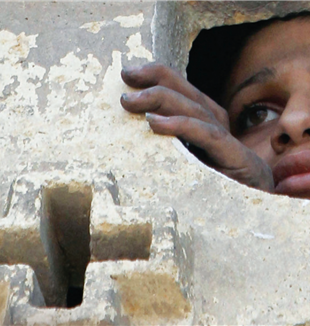
They Are Our Martyrs
“They suffer, they give us their lives, and we receive God’s blessingthrough their testimony.” Pope Francis is asking the world not to turn a blind eye to persecuted Christians.
We think of the “map” that we’ve heard about for so long: Mosul, Aleppo, the Copts in Egypt–all the limbs of the beautiful and ancient Middle East being dismembered by the self named caliphate. But that’s not all. There’s also Nigeria devastated by Boko Haram, and Kenya wounded by Somali al Shabaab; there’s Central Africa, Pakistan, Odisha State in India; there’s China; and there are those refugees thrown overboard by their peers (who were as desperate as their victims) because on that ship from Africa to Europe “you only pray to Allah.” Killed because they were Christian. It’s a phenomenon that’s growing in frequency and scale.
The “Church of martyrs” that Pope Francis is always talking about is expanding every day. “They are more numerous than in the first centuries,” he told us at Easter. Then in his homily on April 21st,“They suffer, they give their lives, and we receive God’s blessing through their testimony.” And again, on Easter, his strong reprimand and challenge to the whole world: “I hope that the international community will not remain mute and inert before such an unacceptable crime, which is a worrying deviation from the most basic human rights.”
A Sui Generis Ethnic Entity
In this “piecemeal World War III,” in which hatred for humanity itself–for others simply because they are “other”–so often turns into violence against minorities and against religious liberty, the persecution of our Christian brothers and sisters is increasingly severe. What does this tell us? And what does it ask of us?
In this month’s Close Up section, you will read witnesses from various Christians who are being persecuted. Certainly, the horrifying pain that they have to endure strikes us, but we are even more surprised by the peace communicated in their words. Hardly any of them expresses even a trace of the desire for revenge. To be defended, yes. To go back to the homes that they have fled, to regain the right to a normal life, yes. But hate, desire for revenge, or retaliation, no. They only express forgiveness and the need to live the faith even more deeply. They help us to understand the message that Fr. Pierbattista Pizzaballa, Custodian of the Holy Land, pressed as most urgent when he spoke at the Meeting of Rimini, and summed up in that phrase that made a lasting impression: “A redeemed gaze.”
That gaze brings good to the whole world. In this “sui generis ethnic entity,” as Pope Paul VI called it–in this minority persecuted not because of geographical or biological ties, but by virtue of their love for Christ, and along with Christ their human brothers and sisters–lies something universal. In that gaze lies something that is constructive, no matter where it is, and is capable of always beginning again. In saving Christians, we defend the world.
Steps Forward
The Church is taking action, as she can, through increasingly firm diplomatic initiatives that are finally gaining support. In March, at the United Nations Council on Human Rights in Geneva, a joint declaration “supporting the Human Rights of Christians and other Communities” was passed. As noted by Archbishop Silvano Maria Tomasi, the Holy See’s Permanent Observer to the UN in Geneva, it is the first time that the issue has been addressed so explicitly in such a forum. Christians are still mentioned along with “other communities,” but they are no longer speaking in terms of generic “minorities.” A few days later, the same topic was addressed at the UN Security Council in New York, where the Frenchman who was taking his turn as President of the Council accepted an appeal from Chaldean Patriarch Louis Raphael Sako of Baghdad and invited him to give a testimony. In April, the Holy See’s Permanent Observer to the UN in New York, Archbishop Bernardito Auza, cited the “earth in Asia soaked in blood,” and noted that “thousands across the world are being persecuted, deprived of their fundamental human rights, discriminated against and killed simply because they are believers.” On April 25th, it was Lebanese Patriarch Bechara Rai’s turn, at the United Nations Educational, Scientific, and Cultural Organization (UNESCO). Support sprung up from unexpected places: from secular France, Russia, and others. Slowly, things are moving. It’s a good sign, but in the meantime what can we do here and now?
To this question, Archbishop Amel Nona, the displaced Chaldean Archbishop of Mosul, gave a response a while back that shocked everyone. “Live your faith with joy. We need to see your happiness.” This is what we mean by a redeemed gaze: filled with Jesus and nothing else, capable of refocusing all our energy to what is essential, and when united, capable of moving anything. For example, Erbil pastor Fr. Douglas al Bazi’s simple but radical admonition at the end of the witness you’ll read below: “Welcome them.” What a change in us when we have them in our thoughts and hearts, when we remember them and, continually, remind the world of them.
This is all part of what moves us to participate in the important gesture that will take place on May 23rd, Pentecost Vigil. The Italian Episcopal Conference and the Church throughout the world is getting involved: parishes, movements, and Catholic associations. It will be only the beginning of a road that requires, in many different forms, only one thing: our conversion.#MiddleEast